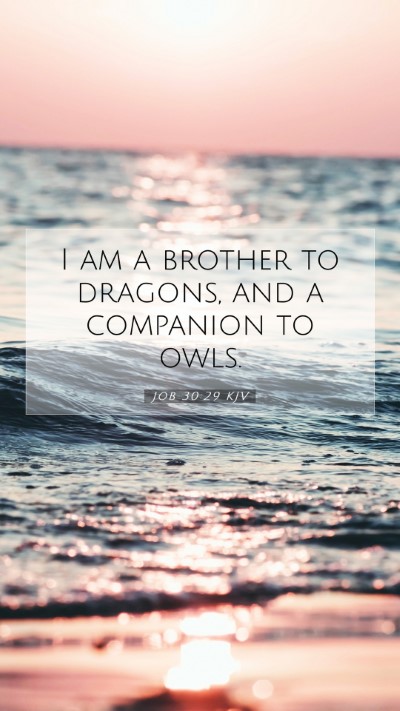Understanding Job 30:29: A Comprehensive Bible Verse Commentary
Job 30:29 reads: "I am a brother to dragons, and a companion to owls." This verse embodies the deep sense of anguish and isolation felt by Job amidst his suffering. In this commentary, we will delve into the meanings, interpretations, and explanations, drawing insights from renowned public domain commentaries by Matthew Henry, Albert Barnes, and Adam Clarke.
Contextual Overview
To fully grasp the meaning of Job 30:29, it’s vital to understand its context within the Book of Job. This text describes Job’s lamentation over his intense suffering and sorrow. Previously, Job had enjoyed great prosperity, but after losing his wealth, health, and family, he now finds himself in a state of desolation.
Matthew Henry's Commentary
Matthew Henry highlights that in this verse, Job uses hyperbolic language to express his profound grief. By referring to dragons and owls, creatures often associated with desolation and darkness, Job illustrates his feeling of estrangement from society and human companionship. Henry notes that these metaphors reflect not only Job’s personal despair but also a broader experience of feeling like an outcast.
Albert Barnes' Insight
Albert Barnes emphasizes that Job’s reference to being a "brother to dragons" signifies his deep alienation. He interprets dragons as representing fierce and formidable creatures, suggesting that Job feels surrounded by danger and fear. Furthermore, the mention of "owls" gives imagery to his loneliness and sorrow, as owls are nocturnal and often symbolize isolation. Barnes further points out the emotional intensity of Job’s situation, highlighting the contrast between Job's prior relationships and his present state of abandonment.
Adam Clarke's Perspective
Adam Clarke contributes to the understanding by suggesting that Job's speech here reveals an internal struggle. The "dragons" and "owls" symbolize not only loneliness but also the haunting presence of his troubles. Clarke argues that Job's deep sorrow is amplified by the stark imagery he uses, realizing that no human companionship is left to him. Clarke stresses that this highlights a spiritual dimension, where Job feels not just physically alone but spiritually disconnected from God as well.
Key Themes and Analysis
- Isolation: The verse emphasizes Job's profound sense of isolation, conveying the emotional pain of being abandoned in times of distress.
- Despair: Job’s imagery of dragons and owls evokes a sense of despair, reinforcing the severity of his misfortunes.
- Symbolism: The choice of animals serves to illustrate not just loneliness, but the magnitude of grief that Job endures.
Related Bible Cross References
- Job 1:14-19 - Describes Job's initial losses.
- Job 2:7-8 - Discusses Job’s physical afflictions.
- Psalm 102:6-7 - Reflects similar sentiments of isolation.
Application of Job 30:29
This verse can serve as a profound reminder of the human experience of suffering and isolation. It invites readers to reflect on their own moments of grief and the importance of empathy for those who suffer. Understanding Job's lament can encourage us to offer support and companionship to those in distress, mirroring the compassion we see reflected in scripture.
Conclusion
In conclusion, Job 30:29 encapsulates a moment of deep sorrow. By utilizing the insights from Matthew Henry, Albert Barnes, and Adam Clarke, we gain richer interpretations of this text. The immense weight of Job's feelings serves as a powerful reminder of the significance of companionship and the universally shared experiences of suffering. As we seek to understand Scripture, this verse encourages us to embrace our roles within our communities, especially in times of hardship.
For those engaged in Bible study groups or utilizing online Bible study resources, this commentary provides essential insights for Bible study lessons and Bible study topics. Understanding the depth of Job’s anguish can foster discussion on how individuals can navigate their own trials and apply the teachings of the Bible to their daily lives.


